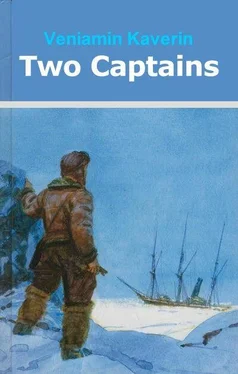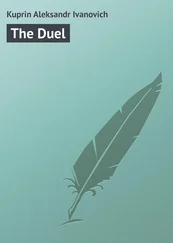The old man was making glue. "Everybody thinks this is just ordinary glue," he said to me. "It's an all-purpose glue. It'll fix anything-iron, glass, even bricks, if anyone's fool enough to want to glue bricks together. I invented it myself. Skovorodnikov's Skin Glue. And the stronger it stinks the stronger it sticks."
He regarded me suspiciously over the top of his glasses.
"Well, let's hear you say something."
I spoke. He nodded approvingly.
"Ah, that's too bad about Ivan!"
Aunt Dasha was away, and did not come back before a couple of weeks. If there was anyone I gladdened-and frightened too-it was she! We were sitting in the kitchen in the evening, and she kept asking me how we had lived in the village, and answered her own questions.
"Poor things, you must have felt pretty lonesome out there, all on your own. Who cooked for you? Petrovna? Petrovna."
"No, not Petrovna," I said suddenly. "We did our own cooking."
I shall never forget the look on Aunt Dasha's face when I uttered those words. Her mouth fell open and she shook her head and hiccupped.
"And we weren't lonely," I added, laughing heartily. "We missed you, though, Aunt Dasha. Why didn't you come to see us?"
She hugged me.
"My darling, what's this? You can speak? You're able to speak? And he keeps quiet, pretending, the young rascal! Well, tell me all about it."
And I told her about the freezing doctor who had knocked at our cottage one night, how we had hidden him for three days and nights, how he had taught me to say "ее", "о" and "yoo" and the word ‘ear'
Chapter Eight
PYOTR SKOVORODNIKOV
Aunt Dasha said that I had changed a lot since I had begun to speak. I felt this myself too. The previous summer I had shunned the other boys, restrained by a painful sense of my own deficiency. I was morbidly shy, sullen, and very sad. Now I was so different it was hard to believe.
In two or three months I had caught up with the boys of my own age. Pyotr Skovorodnikov, who was twelve, became my best friend. He was a lanky, ginger boy with a will of his own.
It was at Pyotr's that I saw books for the first time in my life. They were Tales of Derringdo in Previous Wars, Yuri Miloslavsky and A Guide to Letter Writing on the cover of which was a picture of a bewhiskered young man in a red shirt with a pen in his hand, and above him, in a pale-blue oval frame, young woman.
It was over this Guide to Letter Writing which we read together, that we became friends. There was something mysterious about those different modes of address: "My dear friend", or "Dear Sir". I was reminded of the navigating officer's letter and recited it aloud for the first time.
We were sitting in Cathedral Gardens. Across the river we could see out yard and the houses, looking very small, much smaller than they really were. There was tiny Aunt Dasha coming out onto her doorstep and sitting down there to clean fish. I could almost see the silvery scales flying about and falling glistening at her feet. And there was Karlusha, the town's madman, always scowling or grinning, walking along the bank and stopping at our gate-to talk to Aunt Dasha, probably.
I kept looking at them all the time I was reciting the letter. Pyotr listened attentively.
"Gee, isn't that smashing!" he said. "What a memory. I knew it, too, but I'd forgotten it." Unfortunately, we rarely spent our time together so well. Pyotr was busy; he was employed "selling cigarettes for the Chinese". The Chinese, who lived in the Pokrovsky quarter, made cigarettes and employed boys to sell them. I can see one of them as if he were before me now, a man named Li-small, sallow, with a weazened face, but fairly good-natured: he was considered more generous with the "treat" allowance than the other Chinese. This allowance formed our clear wage (later I, too, took up this trade). We were allowed to treat everyone-"Please, have a smoke"-but the customer who was naive enough to accept the invitation always paid cash down for it. This money was ours. The cigarettes were packed in boxes of two hundred and fifty, labelled "Katyk", "Alexander III", and we sold them at the railway station, alongside the trains, and on the boulevards.
The autumn of 1917 was drawing near, and I should not be telling the truth if I tried to make out that I saw, felt or in the least understood the profound significance of those days for me, for the entire country and the world at large. I saw nothing and understood nothing. I had even forgotten the vague excitement which I had experienced in the spring, when we were living in the country. I simply lived from day to day, trading in cigarettes and catching crabs-yellow, green and grey crabs, with never any luck for a blue one.
This easy life was to end all too soon, however.
Chapter Nine
STROKE, STROKE, STROKE, FIVE, TWENTY, A HUNDRED…
He must have been coming to our place before we got back to town, because everyone in the yard knew him, and that attitude of faint amusement towards him on the part of the Skovorodnikovs and Aunt Dasha had already taken shape. But now he began to call nearly every day. Sometimes he brought something, but, honestly, I never ate a single of his plums, or his pods, or his caramels.
He had curly hair-even his moustache was curly-and he was pie-faced, but fairly well-built. He had a deep voice, which I found very unpleasant. He was taking treatment for black-heads, which were very noticeable on his swarthy skin. But for all his pimples and curls, for all his deep repulsive voice, Mother, unfortunately, had taken a fancy to him. Why else should he be visiting us almost every day? Yes, she liked him. She became quite a different woman when he was there, laughing and almost as talkative as he was. Once I found her sitting by herself, smiling, and I guessed from her face that she was thinking of him. On another occasion, when talking to Aunt Dasha, she said of someone: "Ever so many abnormalities." Those words were his.
His name was Timoshkin, but for some reason he called himself Scaramouch-to this day I can't make out what he meant by it. I only remember that he liked to tell my mother that "life had tossed him about like a twig". In saying this he would put on a meaningful look and gaze at Mother with an air of fatuous profundity.
And this Scaramouch now visited us every evening. Here is one such evening.
The kitchen lamp hangs on the wall and my shock-headed shadow covers the exercise book, ink-well and my hand as it moves the squeaky pen laboriously across the paper.
I am sitting at the table, my tongue pushing out my cheek with the effort of concentration, and tracing strokes with my pen-one stroke, a second, a third, a hundredth, a thousandth. I must have made a million strokes, because my teacher had declared that until they are "popindicular", I cannot make any further progress. He is sitting beside me, teaching me, with now and again an indulgent glance at Mother. He teaches me not only how to write, but how to live, too, and those endless stupid moralisings make me feel dizzy. The strokes come out wonky, pot-bellied, anything but straight and "popindicular".
"Every man's keen to snatch his titbit from life," he said. "And that's what everyone should go after, it's only natural, man is made that way. But will such a titbit guarantee security-that's another matter."
Stroke, stroke, stroke, five, twenty, a hundred…
"Now take me. I got into a difficult atmosphere from a child, and I could never count on my mother's labour power. That was out of the question. On the contrary, when our domestic affairs went to wrack and ruin and my father, accused of horse-stealing, was sentenced to imprisonment, it was I, and no other, who was obliged to become the breadwinner."
Читать дальше












